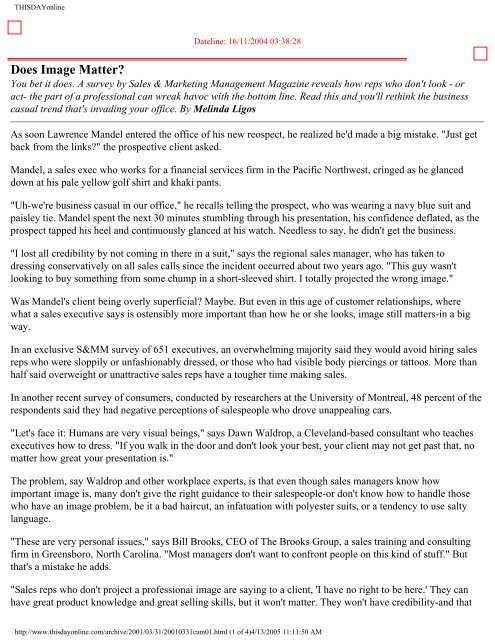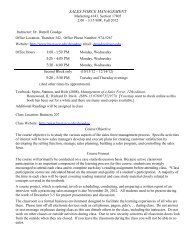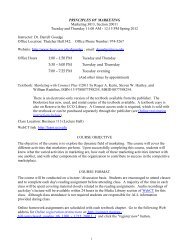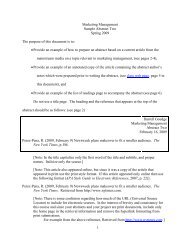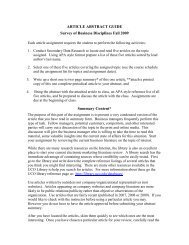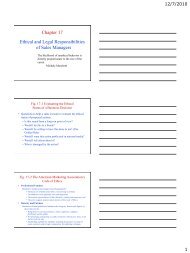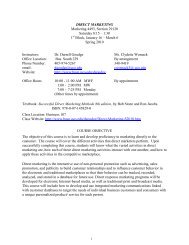Does Image Matter? - UCO College of Business
Does Image Matter? - UCO College of Business
Does Image Matter? - UCO College of Business
Create successful ePaper yourself
Turn your PDF publications into a flip-book with our unique Google optimized e-Paper software.
THISDAYonline<br />
Dateline: 16/11/2004 03:38:28<br />
<strong>Does</strong> <strong>Image</strong> <strong>Matter</strong><br />
You bet it does. A survey by Sales & Marketing Management Magazine reveals how reps who don't look - or<br />
act- the part <strong>of</strong> a pr<strong>of</strong>essional can wreak havoc with the bottom line. Read this and you'll rethink the business<br />
casual trend that's invading your <strong>of</strong>fice. By Melinda Ligos<br />
As soon Lawrence Mandel entered the <strong>of</strong>fice <strong>of</strong> his new reospect, he realized he'd made a big mistake. "Just get<br />
back from the links" the prospective client asked.<br />
Mandel, a sales exec who works for a financial services firm in the Pacific Northwest, cringed as he glanced<br />
down at his pale yellow golf shirt and khaki pants.<br />
"Uh-we're business casual in our <strong>of</strong>fice," he recalls telling the prospect, who was wearing a navy blue suit and<br />
paisley tie. Mandel spent the next 30 minutes stumbling through his presentation, his confidence deflated, as the<br />
prospect tapped his heel and continuously glanced at his watch. Needless to say, he didn't get the business.<br />
"I lost all credibility by not coming in there in a suit," says the regional sales manager, who has taken to<br />
dressing conservatively on all sales calls since the incident occurred about two years ago. "This guy wasn't<br />
looking to buy something from some chump in a short-sleeved shirt. I totally projected the wrong image."<br />
Was Mandel's client being overly superficial Maybe. But even in this age <strong>of</strong> customer relationships, where<br />
what a sales executive says is ostensibly more important than how he or she looks, image still matters-in a big<br />
way.<br />
In an exclusive S&MM survey <strong>of</strong> 651 executives, an overwhelming majority said they would avoid hiring sales<br />
reps who were sloppily or unfashionably dressed, or those who had visible body piercings or tattoos. More than<br />
half said overweight or unattractive sales reps have a tougher time making sales.<br />
In another recent survey <strong>of</strong> consumers, conducted by researchers at the University <strong>of</strong> Montreal, 48 percent <strong>of</strong> the<br />
respondents said they had negative perceptions <strong>of</strong> salespeople who drove unappealing cars.<br />
"Let's face it: Humans are very visual beings," says Dawn Waldrop, a Cleveland-based consultant who teaches<br />
executives how to dress. "If you walk in the door and don't look your best, your client may not get past that, no<br />
matter how great your presentation is."<br />
The problem, say Waldrop and other workplace experts, is that even though sales managers know how<br />
important image is, many don't give the right guidance to their salespeople-or don't know how to handle those<br />
who have an image problem, be it a bad haircut, an infatuation with polyester suits, or a tendency to use salty<br />
language.<br />
"These are very personal issues," says Bill Brooks, CEO <strong>of</strong> The Brooks Group, a sales training and consulting<br />
firm in Greensboro, North Carolina. "Most managers don't want to confront people on this kind <strong>of</strong> stuff." But<br />
that's a mistake he adds.<br />
"Sales reps who don't project a pr<strong>of</strong>essionai image are saying to a client, 'I have no right to be here.' They can<br />
have great product knowledge and great selling skills, but it won't matter. They won't have credibility-and that<br />
http://www.thisdayonline.com/archive/2001/03/31/20010331cam01.html (1 <strong>of</strong> 4)4/13/2005 11:11:50 AM
THISDAYonline<br />
will cost your company."<br />
The first step to helping reps put their best foot forward, says Brooks, is to set guidelines on what's acceptable.<br />
Clothes Make the Man (and Woman)<br />
Got a rep who thinks business casual means a two-day beard and faded jeans Don't blame him: Blame today's<br />
ultra-confusing fashion climate. "Casual dress means a variety <strong>of</strong> different things to a variety <strong>of</strong> different<br />
people," says Lauren Solomon, a New York-based image consultant. "And very few managers have taken the<br />
responsibility to really show employees what casual means in their industry."<br />
In fact, Solomon adds, very few sales managers give any fashion guidance to reps at all. Such lack <strong>of</strong> direction<br />
can be dangerous. One sales manager in the technology industry recalls a recent situation where a sales rep<br />
showed up at a presentation wearing a short skirt and high-heeled boots. "She looked like a hooker," says the<br />
manager, who has since instituted a dress code for all reps.<br />
The best way to safeguard your staff from such fashion faux pas is to set explicit standards as to what, for<br />
example, constitutes casual work attire, if that's the look you're going for. "Spell it out says Solomon, who<br />
recommends that men cultivating the business casual look should wear well-pressed slacks with a long-sleeved,<br />
starched shirt. For women, she suggests a pantsuit with a pr<strong>of</strong>essional-looking blouse. Also, she adds, "tell them<br />
what's not acceptable."<br />
Some managers hold seminars to help reps learn how to dress correctly, or even take them on shopping sprees.<br />
Brooks, for instance, has a pr<strong>of</strong>essional suitmaker outfit his six sales staffers, and <strong>of</strong>ten fronts new employees<br />
the money to purchase new duds. He also organizes workshops where image consultants go over the finer points<br />
<strong>of</strong> grooming and accessorizing. "The smaller items like your belt and your briefcase are crucial," he says. "If<br />
your accessories are not in great shape, it tells people that you're not a person who pays attention to detail."<br />
Even in <strong>of</strong>fices where business casual is the rule, experts suggest that reps dress more pr<strong>of</strong>essionally for sales<br />
calls. One rule <strong>of</strong> thumb is to have salespeople mirror the outfits <strong>of</strong> their clients, but some sales managers<br />
disagree. When Dave Wolkowitz sold advertising time for a modern rock radio station, he had to call on an<br />
outdoor gear store. "Conventional wisdom would dictate that I go in there wearing khaki pants and a fleece<br />
vest," says Wolkowitz, who now manages brand contact development for PR 21, a marketing communications<br />
firm based in Chicago. But Wolkowitz knew that the client-who was the radio station's biggest advertiser-liked<br />
to know that Wolkowitz's team was bending over backwards to keep the account. "I dressed up as a symbolic<br />
gesture," he says. "It made him feel like I was putting a lot <strong>of</strong> work into everything I did for him."<br />
A safer bet, says Sam Parker, c<strong>of</strong>ounder <strong>of</strong> Justsell.com, a sales consultancy based in Fairfax, Virginia, is to<br />
always dress one notch above your client. "If he's wearing a sportcoat, you put on a suit," he says. "Nobody is<br />
going to look at you poorly because you are slightly overdressed."<br />
Slightly is the key word here. There is a danger <strong>of</strong> going overboard as well. Bob Mander, author <strong>of</strong> Sales:<br />
Building Lifetime Skills for Success, recalls when he once called on a client in the publishing industry. While<br />
waiting for the prospect, he heard someone yell, "There's a suit here to see you!" "I went home and bought a<br />
sportcoat," he says.<br />
Once you've given reps guidelines on how to dress, you may have to speak individually with those who continue<br />
to project the wrong image, says Steve Waterhouse, a principal at Waterhouse Group, a sales consulting firm in<br />
Scarborough, Maine. "Don't get too personal," Waterhouse advises. Instead, explain to them how dressing better<br />
http://www.thisdayonline.com/archive/2001/03/31/20010331cam01.html (2 <strong>of</strong> 4)4/13/2005 11:11:50 AM
THISDAYonline<br />
can help them make more money. "Say, 'Here's why I think wearing this will look better for you,"' he says.<br />
"Couch it as a benefit for the salesperson."<br />
Of course, there may be cases where you choose to ignore a salesperson's fashion faux pas. Waterhouse recalls<br />
an instance when he worked as a sales manager in the electrical components industry where one rep wore<br />
outlandish plaid sportjackets. "He looked just like that cheesy guy from WKRP in Cincinnati," Waterhouse says.<br />
Before confronting the salesman, Waterhouse decided to go on a few sales calls with the rep to see how his<br />
clients reacted to his bizarre attire.<br />
"I realized that this guy's clients loved him because he oozed service and sincerity," he says. After that day,<br />
Waterhouse elected not to say anything to the rep about his clothing choices. "The look was obviously working<br />
for him," he says.<br />
The Skinny on Overvveight Reps<br />
Eric Steele spent six years working as a rep for a national leasing company based on the West Coast. During<br />
that time, he watched as his colIeague- an energetic, hard worker who was about 5- feet10 and 300 poundscontinually<br />
got passed over for promotions. "Because he was fat, he wasn't seen as a serious player that could be<br />
presented to clients as a key member <strong>of</strong> our team," says Steele, who has since switched jobs. "He just didn't<br />
show well."<br />
lndeed, more than 53 percent <strong>of</strong> the respondents in the S&MM survey felt that overweight salespeople have a<br />
tougher time making sales. Unfortunately, stereotypes that portray overweight people as being lazy or<br />
incompetent pervade the business world. "There's a perception that fat people don't pay attention to important<br />
things" Waterhouse says. "Their chance <strong>of</strong> getting respect is dramatically smaller than the chances <strong>of</strong> a thin<br />
person."<br />
Refusing to hire or promote overweight reps is potentially discriminatory. In some states, disability laws protect<br />
those whose obesity is the result <strong>of</strong> a medical condition. And employers who refuse to hire overweight women,<br />
but readily accept overweight men, are treading on thin ice. "If an employer has a weight or standard, it has to<br />
be applied evenly across the board," says Richard L. Steer, cohead <strong>of</strong> the employment group at Jones Hirsch<br />
Connors & Bull, a New York-based law firm.<br />
What managers can-and should-concentrate on is encouraging overweight reps to project a stylish and energetic<br />
image. "Focus on how that person's clothes fit her and whether or not she has an up-to-date look," Waldrop<br />
says. "These are issues that you can help her correct.".<br />
Mander strongly encourages such salespeople to maintain a regular exercise program. "You don't need to be a<br />
body builder or a beauty queen but you must give <strong>of</strong>f the essence <strong>of</strong> good health and vibrancy," he says. "Your<br />
customers need to know that you're going to be energetic in pursuing their needs."<br />
Money Talks<br />
It's not just how sales executives look that's important-how they spread their message is key, too. Reps who use<br />
foul language, use slang, or speak with a heavy regional or foreign accent have a more difficult time closing<br />
deals, according to the S&MM survey.<br />
Charlene Golden knows this all too well. Two years ago, Golden and a coworker were about to close a<br />
$30O,000 deal over lunch with their most promising new prospect. But when the topic <strong>of</strong> conversation suddenly<br />
turned to a woman in the industry the three <strong>of</strong> them all knew, Golden's coworker made a fatal mistake: "He used<br />
http://www.thisdayonline.com/archive/2001/03/31/20010331cam01.html (3 <strong>of</strong> 4)4/13/2005 11:11:50 AM
THISDAYonline<br />
the 'c' word" to describe the woman," says Golden, who is still fuming about the incident even though it<br />
occurred nearly two years ago. (She now works for a different firm.) After the word was uttered, Golden says<br />
her client-a woman-looked at the two in disgust. "The camaraderie was gone," she says, "and she took <strong>of</strong>f soon<br />
after," without signing on the dotted line.<br />
Golden says her colleague called the prospect later to apologize for his salty language, but to no avail: "Our<br />
pr<strong>of</strong>essional image had been shattered with the use <strong>of</strong> one word," she says.<br />
"Salespeople who swear are taking a big risk," says Jim O'Connor, author <strong>of</strong> Cuss Control. "At best, they're<br />
express-ing negativity. And at,,worst, they're con-veying that they don't have any respect for their client."<br />
O'Connor recommends that sales managers encourage reps to curb foul language when they're talking with<br />
clients - even ones they feel comfortable with. Steele agrees. "I don't care who I'm talking to," says the sales<br />
manager, who <strong>of</strong>ten calls on clients who use foul language themselves. "You never know when a certain word is<br />
going to make someone feel uncomfortable. Why risk it"<br />
It's not just <strong>of</strong>f-color language that is problematic. Experts say slang and jargon should be avoided, too. At<br />
Topnotch at Stowe Resort & Spa in Stowe, Vermont, sales reps attend weekly workshops that address such topics<br />
as how to use proper grammar. "We represent a luxury property so we can't go into sales calls using a lot <strong>of</strong><br />
'ums' and 'ahs,"' says Nicole Junas, the resort's sales and marketing manager. "We'd lose all credibility."<br />
Managers who work to help reps project a positive personal image - through: style and language - aren't just<br />
ensuring, they present a prettier picture to clients. Studies have shown that those who dress pr<strong>of</strong>essionally feel<br />
better about them selves - and present a more confident image to clients. "I'm more comfortable' standing in<br />
front <strong>of</strong> a client when I'm dressed up and well-groomed," says Burt Smith, vice president <strong>of</strong> marketing for<br />
MediaBin, a high-tech firm in Atlanta. Though Smith wears business casual attire around his <strong>of</strong>fice - ever<br />
donning jeans on Fridays - he won't go to a client's <strong>of</strong>fice in anything less than a pair <strong>of</strong> heavy wool slacks and a<br />
starched shirt. "Looking good is a critical part <strong>of</strong> a salesperson's self-confidence," he says. <strong>Image</strong> experts agree.<br />
"Salespeople who look good exude confidence about their companies and themselves," Waldrop says. "What<br />
manager wouldn't want to help their (reps) learn to feel that way".<br />
Who Are We | About THISDAYOnLine.com | THISDAY People | Contact Us<br />
© Copyright 2000 Leaders & Company Limited<br />
http://www.thisdayonline.com/archive/2001/03/31/20010331cam01.html (4 <strong>of</strong> 4)4/13/2005 11:11:50 AM


